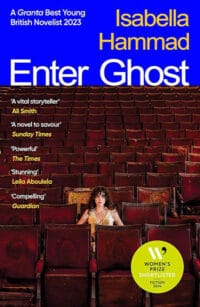Book review: Enter Ghost by Isabella Hammad
 After a year of war, starvation, genocide, reading books by Palestinian authors feels like such a tiny, insignificant act. But – alongside campaigning, writing to MPs, boycotting and divesting – I do think there is real value in sharing Palestinian stories. Sadly I think there are people who need reminding that Palestinians are human beings, who had stuff going on in their lives beyond minute-to-minute survival before all this. And for the rest of us, learning everything we can about Palestine past and present certainly can’t hurt.
After a year of war, starvation, genocide, reading books by Palestinian authors feels like such a tiny, insignificant act. But – alongside campaigning, writing to MPs, boycotting and divesting – I do think there is real value in sharing Palestinian stories. Sadly I think there are people who need reminding that Palestinians are human beings, who had stuff going on in their lives beyond minute-to-minute survival before all this. And for the rest of us, learning everything we can about Palestine past and present certainly can’t hurt.
Perhaps most important, I want to share genuinely good books by less-well-known authors. And while there are many excellent Palestinian writers, very few could be considered well known. So I will continue scouring all the lists of Palestinian books, buying them, reading them and sharing them.
British-Palestinian author Isabella Hammad features on a lot of those lists, and in particular her 2023 novel Enter Ghost. It’s about Sonia, a Palestinian-British actress who finds herself without work for the summer after a disastrous affair with a director, whose casting promises evaporate when they break up. So she decides to visit her sister Haneen who lives in Haifa (in what is now Israel), where their grandparents lived. While there, Sonia is talked into joining the cast of an Arabic production of Hamlet in Ramallah, directed by her sister’s friend Mariam.
“The driver laughed… ‘Jewish?’
“I pretended I hadn’t heard. I think he had guessed I was Arab or I doubt he would have asked. I didn’t like these dances between drivers and their passengers, testing origin, allegiance, degrees of ignorance. In the final move before the jingle of change he would probably burst out with some story of loss and political alienation. I resisted the idea of being bonded to this person.”
Like many Palestinian diaspora, Sonia and Haneen visited their family in Haifa every summer. But she has only been to the West Bank once before, when she was 15, a brief visit that has stayed with her ever since. Their family make a point of calling themselves Palestinians, not Arab Israelis, but the Palestinians in the Occupied Territories call them ‘48-ers – referring to the year 1948 when Israel was created from land that was previously Palestine. The ‘48-ers enjoy some privileges, including Israeli passports, but when another character calls Mariam an Israeli citizen she laughs derisively.
This is just one aspect in a complex web of privilege around nationality, religion, skin colour and language when travelling between Israel and Palestine. Sonia is British, she’s Christian, she speaks English – she can pass for Israeli if she wants to. But her second language is Arabic, not Hebrew. We see Israeli reactions to her do a complete 180 as they realise this and what it means.
“One foreign national with an Arab name, two Palestinian citizens of Israel and one West Bank resident with a temporary permit sit in a car with yellow Israeli plates approaching a checkpoint. The line is sluggish; the soldiers are investigating every vehicle, regardless of the number-plate colour. Near the windowless tower, a shabby Israeli flag roils on the wind, looking not at all like those forlorn fraying Palestinian flags that, once illegal but now par for the course, adorn electricity pylons across Ramallah, but rather somehow eternal and careless, a mark of the ragged outposts of empire.”
But this is also a novel about theatre. Much of the novel is taken up by rehearsals for Hamlet. It explores the creativity, emotions and egos at play during rehearsals. It also follows the struggles of getting funding, putting a cast together, finding a venue – pressures that aren’t unique to this production but are certainly extra complicated in its case.
It makes for an interesting mix of topics. There are some aspects of the classic British literary novel: a woman in her 40s musing on love, career, family and how the world sees her. It’s also a story about friendship and belonging. But its setting is inescapable. From the first scene, Israeli soldiers are ever-present, ever-threatening.
This autumn Hammad released a new book, Recognising the Stranger: On Palestine and Narrative. It’s a non-fiction work directly addressing the current ongoing war on Palestine. She also has a previous novel called The Parisian, a historical novel about Palestine through the first half of the 20th century. Both sound like good reads, as well as useful additions to my knowledge.
Published 2023 by Jonathan Cape.
Source: Heron Books, Bristol.
One Comments
Comments are closed.